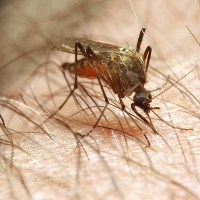
Jakarta, the Malaria Vaccine until now no one has managed alias always fail. Though the vaccine is needed to prevent the severity of malaria in many countries which sometimes cause death. But the development of new malaria vaccine trial shows promising results.
Every year, worldwide there are approximately 225 million people suffer from malaria with a mortality rate of about 800,000 souls, especially in children in Africa.
Malaria is caused by a parasite called Plasmodium, which is transmitted through the bite of an infected mosquito. In the human body, the parasites multiply in the liver and then infect red blood cells.
Appropriate and effective treatment for malaria is artemisinin-based combination therapy. However, malaria prevention is better when compared with treatment of the disease then it continues to manufacture the vaccine cultivated.
Latest news from malaria vaccine trials have shown promising results in clinical trials in Africa. In that trial, infants who were given vaccine prototypes can reduce about half the risk of contracting malaria compared with infants who are not vaccinated.
The vaccine, known as RTS, S is one of two experimental malaria vaccine being tested around the world. The study was conducted for 1 year and has involved more than 15,000 children under the age of 18 months. The study has been published in The New England Journal of Medicine.
Malaria vaccine trials have been conducted in 7 countries in Africa. In the present study has been divided into 2 groups of infants aged 6-12 weeks and 5-17 months old baby.
One year later, there were about half the number of malaria cases in the group of children given the vaccine, compared with children in the control group who received vaccines for other diseases.
"Data from these studies indicate that it has discovered the world's first malaria vaccine," said Andrew Witty, head of the British pharmaceutical company as reported from BBCNewsHealth, Wednesday (10/19/2011).
The vaccine has been developed together with non-profit PATH Malaria Vaccine Initiative. In the malaria vaccine research has involved an international team consisting of dozens of scientists from Africa, the United States and Europe.
"Early results show that RTS, S/AS01 lower half the risk of malaria in children aged 5-17 months for 12 months after vaccination. In addition, the vaccine has the potential to have an important impact on the eradication of malaria in children in Africa," said the the researcher.
The results of the vaccine in younger infants still be analyzed. World health experts say the vaccine is less effective when compared with other vaccines for common infections such as polio and measles, and the cost of a malaria vaccine is also not clear.
Tsiri Agbenyega, a principal investigator of vaccine trials in Ghana, said the malaria vaccine will contribute to the control of malaria than not using the vaccine at all.
World Health Organization (WHO) declared the progress made in malaria vaccine development, including extraordinary to be able to combat the disease. With the use of vakin malaria can occur nearly 20 percent decline in the number of deaths worldwide over the last 10 years.
An examination and discussion of other potential vaccines have recently shown promising results. Testing and discussion is designed to test security.
But researchers found that 45 children given the vaccine MSP3 has a high level of protection against the disease. Test results and discussion in Burkina Faso have also been published in The New England Journal of Medicine.
Research malaria vaccine RTS, S was funded by GSK and the PATH Malaria Vaccine Initiative, and assisted by a donation from the Bill and Melinda Gates Foundati
Tidak ada komentar:
Posting Komentar